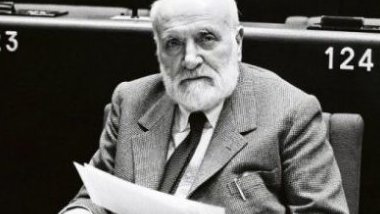(Giorgio Napolitano, President of the Italian Republic, May 21, 2006, Island Ventotene - Lazio - in commemoration of the anniversary of the death of Spinelli).
Ventotene ...
The first trip of the new president of the Italian Republic, Giorgio Napolitano, has been the island Ventotene. A mysterious name for most French readers.
On this island, during the twenty years of fascism, were “confined” anti-fascists. Away from it all, lost in the middle of the Mediterranean Sea, this rock was home for a few years of intellectuals from all over Italy and sometimes beyond. The fascist regime, unable to convince everyone in jail, had decided to reintroduce this barbaric practice of containment.
And on this island in the middle of the war, some young people from different political families, gathered around the figure of Spinelli, drafted a manifesto for a free and united Europe. The foundation stone for a political adventure that will last sixty years and continues today, as evidenced by the homage of the Italian President.
The spinellien heritage, federalist thought
Twenty years ago this great European went out . The European Parliament, after pushing its proposed reform treaty for Europe ultimately ignored by the Head of State and Government in 1985 decided to devote one of these buildings in Brussels to a man who had devoted his life to the unification of the continent and the building a democratic Europe.
Often ignored by official history, the legacy of Spinelli is nevertheless fundamental to understand what Europe is, what drove so many men to devote their lives to the unification of the continent, and that to which we must continue inexorably to tender.
The division of Europe and the world in national sovereign states means condemn men to survive in a state of war. The only way to go to save humanity from a slow self-destruction is the construction of a system of world government that puts an end to the myth of national sovereignty and which replaces the tyranny of the strongest by the rule of law .
The real obstacle to the progress of humanity lies in this artificial and dangerous division . Henceforth, the dividing line between progressives and conservatives is no longer between those who want more or fewer states, but between those who argue in favor of exceeding the national sovereignty and those who want to retain all the power within National states.
National sovereignty corresponds to the abandonment of true popular sovereignty as its defense leads to deny individuals the ability to achieve their main aspiration: peace. If peace is an ideal towards which naturally men go, while the national state is an obstacle to the full realization of the general will because it keeps men in a state of war or truce.
“Pacifism Is Not Enough” [1]
However, the lesson of Spinelli is not just a pacifist predication. The realism and the need for concrete political action are central to his thinking. Realism first, which is not to yield to the temptations of folds nationalist, to the convenient but false opinions of those who preach “each at home” or the maintenance of the national state as the sine qua non condition of any democratic development.
A realism which reverses the usual perspective and which make understand that the utopian is the one who thinks it is possible to guarantee peaceful coexistence in keeping humanity divided into sovereign states. A realism that pushes Spinelli to imagine a model that could be implemented quickly and effectively at European level and which leads him to create the backbone of this project: the European Federalist Movement (MFE).
The creation of MFE in 1943, illustrates the need for political action that will guide the free man’s life of Spinelli. Twenty years in fascist jails and on the islands of Ponza and Ventotene, twenty years to reflect on remedies for the European disease and its universal character. Once free, Spinelli will continuously carry out his project, thinking and adapting its strategies to the current political situation.
First liberation movement, then adviser of the prince from the end of the war, working to influence De Gasperi, Monnet and Spaak, then popular movement, demonstrating a genuine desire of people to European unification, while governments procrastinate, finally external bearing force to the Spinelli’s increasing institutional initiatives, and culminating in the draft Treaty of 1983, the MFE will adapt to political circumstances and evolve. Its existence reflects the desire to place the European building in the heart of politics.
Today MFE is became the UEF (Union of European Federalists). It exists in all of Europe. It has a younger branch, to which the Italian president has testified his sympathy during his recent speech at Ventotene. It organizes every year on the island, a training seminar on Europe and federalism. And shows every day, the need to continue tirelessly the federal unification of humanity.



Follow the comments: |
|
